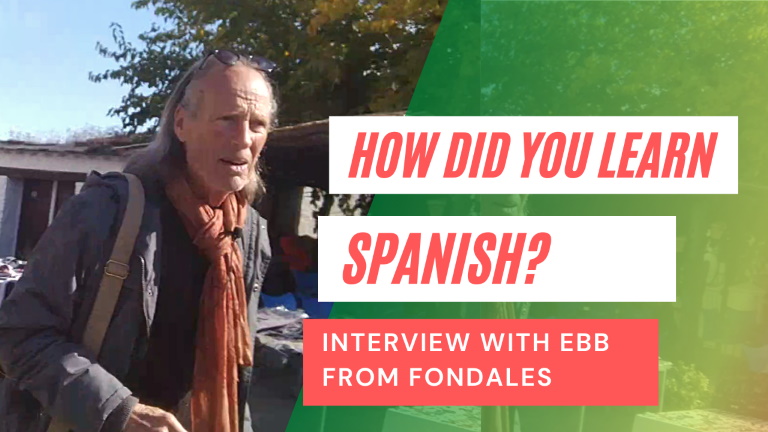This is the question I asked Ebb last Friday on the market in Pitres.
Ebb is from Germany but he has spent the last 35 years here in the Alpujarras, Granada.
He raised his two children in a small “cortijo” (farmhouse) up in the mountain above Pitres, and now lives in a nearby village, Fondales.
I love Fondales, it is the village that first welcomed me when I arrived here with my husband ten years ago (in 2010). And it is the village where our first kid was born. So he’s a “Fondalero”!
So how did Ebb start speaking Spanish?
So to come back to Ebb’s story, he arrived in Spain without knowing a word of Spanish… and shared this cortijo with a couple of cortijeros (people who work and live in the farmhouse), who had never travelled outside of the Alpujarras. So you can easily imagine they didn’t know a word of English (or German).
This meant that Ebb had a huge motivation to learn Spanish. He absolutely needed to communicate with his new “house mates” and with the village neighbours.
I asked him how he managed, and this was his answer:
Well, you know, I started with the basics, “Hello”, and so on, and learnt how to ask questions: “What did you say?”, “Can you repeat?”, “What is this?”. This allowed me to pick new words every day, and to start communicating.
Of course, most of his communications involved gestures and sounds, and making lots of errors in the beginning, but this is the most powerful way to learn a language.
Just like children!
Actually this is exactly how children learn their first language, by listening all day long, then starting to repeat when they feel ready.
In fact, they don’t study the language, they ACQUIRE it. They let it sink into their brain.
And whenever they hear words that they need (like “water”, “eat”, “pee”), they try to repeat them every time they hear them.
At first, they might not pronounce the words correctly, they will make funny and short sentences (“Bo bip-bip papa”, my little one told me this afternoon, to say he (Tibó) had been on a tractor with his Dad!), but they will make themselves understood.
And every time they will have a strong motivation to say something, they will try and say it, even if it isn’t correct. Even though they know it isn’t correct! They don’t care, they just WANT and NEED to say it, so they find a way.
By persevering day after day, the words and sentence structures, that hear all the time and so strongly want to know and be able to repeat, ends up sinking into their long-term memory.
For small kids, it’s a long process that takes several years, but for adults the learning process can actually be much shorter.
Learn quicker as an adult
Why?
- Because we know how to articulate (unlike babies)
- Because we already know a first language, and we can make connections with that first language (identical or similar words, similar sounds…)
- Because we can study the structures of the langage
- Because our memory is exponential
In a following article, I will go more in depth into how to make language learning an easy process…
For today, I’ll let you with the interview I made with Ebb, in the video below, where he tells me about his own path and gives us a few tips about how to learn Spanish… The interview is in Spanish and I’ve added English and Spanish subtitles.
TIP FOR WATCHING THE VIDEO:
If you don’t understand much (or any) of what is being discussed look at the English subtitles to start with. Then listen to the video again, this time reading the Spanish ones. And watch it again in a few days to see how much your brain has processed and how much more you can understand 😉
If you already understand some or all of the conversation, don’t look at the English subtitles, read the Spanish ones instead, they will help you recognise the words that you’ve missed. Then watch it again in a few days to see how much more you understand!
Here goes the video – please “like” and “share” it with anyone you think might enjoy it!
Bonus: TRANSCRIPTION OF THE VIDEO + TRANSLATION TO ENGLISH
1. TRANSCRIPTION:
Hola Ebb, ¿cómo estás hoy? Yo, perfecto
Pues estoy hoy con Ebb, de Fondales
Quería hacer unas preguntas,
sobre cómo… ¿Cuánto tiempo llevas hablando español?
Empezé hace 35 años, porque llegué aquí
Llegué aquí y no sabía ni una palabra, entonces…
Tenía que… Estaba en un cortijo
con una gente… de allí arriba… en el cortijo, y
Tenía que hablar con ellos, porque no… Entonces empezé
¿Y eran españoles? ¿O eran estranjeros?
Claro, cortijeros… cortijeros…
Alpujarreños de sangre pura
De aqui de toda la vida
Claro
¿Y fue fácil o difícil? ¿Cómo lo hiciste?
Bueno, primero con las cosas básicas: Hola, no sé qué
Bueno luego con el tiempo… Los niños aprendieron más rápido que yo
¿Tus niños no?
Claro
Entonces…
¿Y tú hiciste algún curso de español? ¿Seguiste una formación?
Nada. ¿Nada?
No, empezé a hablar alpujarreño poco a poco
Alpujarreño directamente, ¿no?
Ahora hablas con mucha fluidez, no tienes ningún problema, ¿no?
Claro, después de tanto años No, me apaño
Claro que a mi edad, creo que perder el acento no va a ser posible
No, pero hablas muy bien
Y si tuvieras un consejo para los extranjeros que vienen aquí
Y intentan aprender español
¿Cuál sería tu mejor consejo?
Bueno el primero es que se den cuenta dónde están
y que no pierdan su curiosidad
Si eres curioso y quieres saber
Tienes que hablar con la gente. Hablar con la gente, ¿no?
Es la única forma casi, no?
Claro porque puedes hacer muchos cursos, ¿no?
Alguna gente que conozco me dice que han hecho muchos cursos
Y todavía siguen sin entender lo que les dicen
Claro, porque los cursos también son
muy teóricos… De cosas que no…
Que no interesan mucho aquí, ¿no?
Hay cuatro palabras que tienes que aprender primero
“Acequia”, “Alberca”
“Balate”, y
…concentrarte primero…
Y “Bancal”
…en lo relevante en tu vida, ¿no?…
Son las cosas que primero tienes que aprender
Es lo más necesario para ti en tu vida cotidiana
Y cuando vale esto… y “¿Qué has dicho?”, “No te entiendo”
Preguntando
Sí, aprende a preguntar, ¿no?
Si has llegado a esto
pues ya… te apañas mejor, ¿no?… Ya, y poco a poco
Vas a ir entendiendo cada vez más
Entrar en una discusión un poco más profundizada
Pues eso es ya… cuando empieza
cuando te sientes… ah… ¡por fín!
He llegado a esto
porque… o…
Llamar por teléfono, súper difícil al principio, ¿no?
Que sufres mucho, te apuntas todo al principio
Apuntar, es un truco ¿no? Apuntar antes de…
Cuando tienes que llamar…
Pues yo me apunté… me pregunté…
Las frases…
Luego tenía los niños que siempre me corrigieron
Te ayudaban, ¿no? Sí, claro
Son mis maestros
Muy bien, genial, pues… Son consejos geniales, muchas gracias
De nada
Y ¡hasta pronto, Ebb! ¡Hasta pronto!
¡En chino! Vamos a China y aprendemos todos chino…
Sí sí, o yo aprendo alemán, ¡y a ver si tenemos una conversación en tu idioma!
Muy bien, ciao
Ponerse las pilas…
¡Sí, eso!… ¡Gracias!
2. TRANSLATION:
Hi Ebb, how are you today? Me, perfect
Well, today I’m with Ebb from Fondales.
I wanted to ask a few questions,
about how… How long have you been speaking Spanish?
I started 35 years ago, because I arrived here…
I arrived here and I didn’t know a single word, so…
I had to… I was in a farmhouse
with some people… from up there… in the cortijo, and
I had to talk to them, because… So I started…
And were they Spaniards? Or were they foreigners? Of course, cortijeros… cortijeros…
Alpujarreños of pure blood.
Who have been here all their lives.
Sure
And was it easy or difficult? How did you do it?
Well, first with the basics: Hello, I don’t know what…
Well then with time… The children learned faster than I did
Your kids, right?
Sure
So…
And did you do any Spanish courses? Did you have any training?
Nothing. Nothing? No, I started speaking Alpujarreño little by little.
Alpujarreño straight away, right?
Now you speak very fluently, you don’t have any problems, do you?
Sure, after so many years. No, I get by.
Of course, at my age, I don’t think it’s possible to lose the accent.
No, but you speak very well.
And if you had a piece of advice for foreigners who come here
And try to learn Spanish
What would be your best advice?
Well, the first one is that they should realise where they are
and not to lose their curiosity
If you’re curious and you want to know
You have to talk to the people.
Talk to the people, right?
It’s the only way almost, isn’t it?
Of course because you can do a lot of courses, can’t you?
Some people I know tell me that they’ve done a lot of courses…
And they still don’t understand what they are told
Of course, because the courses are also
very theoretical… About things that don’t…
That are not of much interest here, are they?
There are four words you have to learn first
“Acequia”, “Alberca”
“Balate”, and
…concentrate first…
And “Bancal”
…on what’s relevant in your life, right…?
These are the things you have to learn first
It’s what’s most necessary for you in your daily life
And when this is ok… then “What did you say?”, “I don’t understand you”…
By asking
Yes, learn how to ask, you see?
If you’ve come to this point
then… you get by better, don’t you… Yes, and little by little
You’ll understand more and more
Enter into a more in-depth discussion
Well, that’s really… when it starts
when you feel… ah… at last!
I’ve reached this
because… or…
Making a phone call, super difficult at the beginning, isn’t it?
You suffer a lot, you write everything down at the beginning.
Write down, it’s a trick, isn’t it? Write down before…
When you have to call…
Well, I wrote down… I asked myself…
The sentences…
Then I had the children who always corrected me
They helped you, did they?
Yes, of course.
They are my teachers
All right, great, well… That’s great advice, thank you very much
You’re welcome.
And see you soon, Ebb! See you soon!
In Chinese! Let’s go to China and we’ll all learn Chinese…
Yeah yeah, or I’ll learn German, and see if we can have a conversation in your language!
All right, ciao
Get your act together…
Yes, that’s it!… Thank you!

